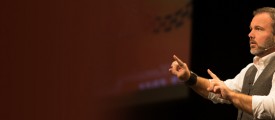By Nate Keeler, Campus Pastor @MBCArlington
The Pharisees, most of us know. They were the politically conservative, religious elite who opposed the Roman occupation of Israel and sought a return to strict observance of the Mosaic Law and their own regulations they heaped on top of the Law. They believed that religious observance and morality were the way of self-salvation. The Herodians we may be less familiar with. The Herodians, as the name implies, were a Jewish political party that favored the Roman control led by Herod. The Herodians were the politically progressive, moral relativists of the day. They wanted to bring the full Roman influence into the Jewish community of the day. They believed that self-discovery and the progress of the Roman empire were the means to salvation. The Pharisees saw themselves as good moralists and the Herodians as deviant rebels. The Herodians saw themselves as good, self-actualizing citizens and the Pharisees as narrow-minded, self-righteous bigots. Unlikely allies? I think so!
In Mark 3 we see Jesus getting into conflict with the Pharisees for healing on the Sabbath (a period of time to abstain from work).
“Then Jesus asked them, “Which is lawful on the Sabbath: to do good or to do evil, to save life or to kill?” But they remained silent. He looked around at them in anger and deeply distressed at their stubborn hearts, said to the man, “Stretch out your hand.” He stretched it out, and his hand was completely restored. Then the Pharisees went out and began to plot with the Herodians how they might kill Jesus.” Mark 3:4-6
Jesus points out the Pharisees hypocrisy with a question that stumped the religious elite—is it lawful to do good or to do evil on the Sabbath? But the hearts of the Pharisees were so full of pride that they refused to reconsider their hypocrisy. Instead of repentance they did the unthinkable—they linked up with their enemies, the Herodians, to plot to kill Jesus.
These unlikely allies represent two broad categories of religion that we see today—the morally self-righteous and the independent moral relativists. Both are religious systems of self-salvation who think they don’t need Jesus’ righteousness. Yet the irony is that the cross of Christ doesn’t say the good are in and the bad are out, or the morally self-righteous are right and the morally independent are wrong. The cross of Christ does away with the religious systems and clears the deck. The wonder of the cross is that Jesus died for both groups of enemies who wanted him dead.



